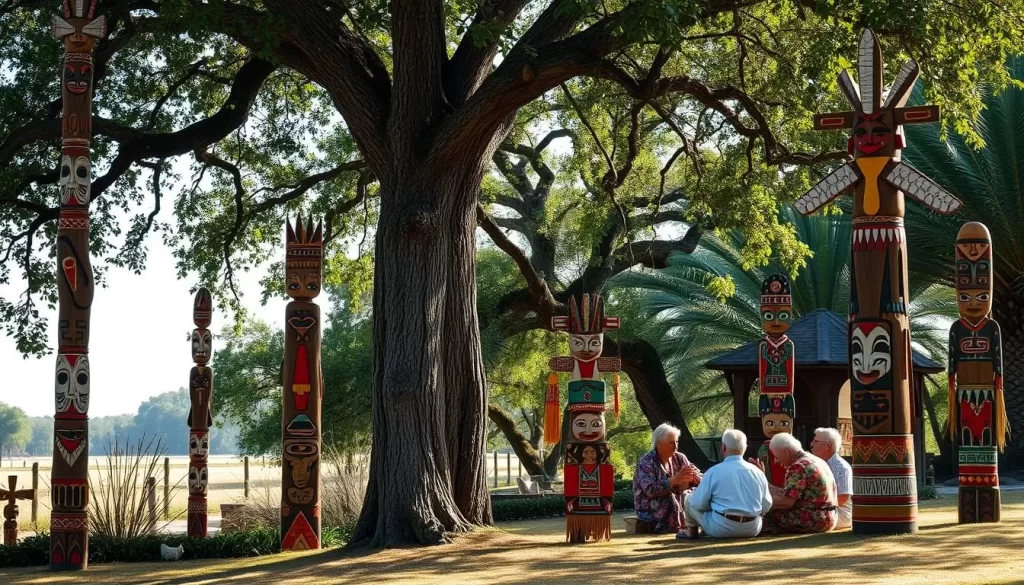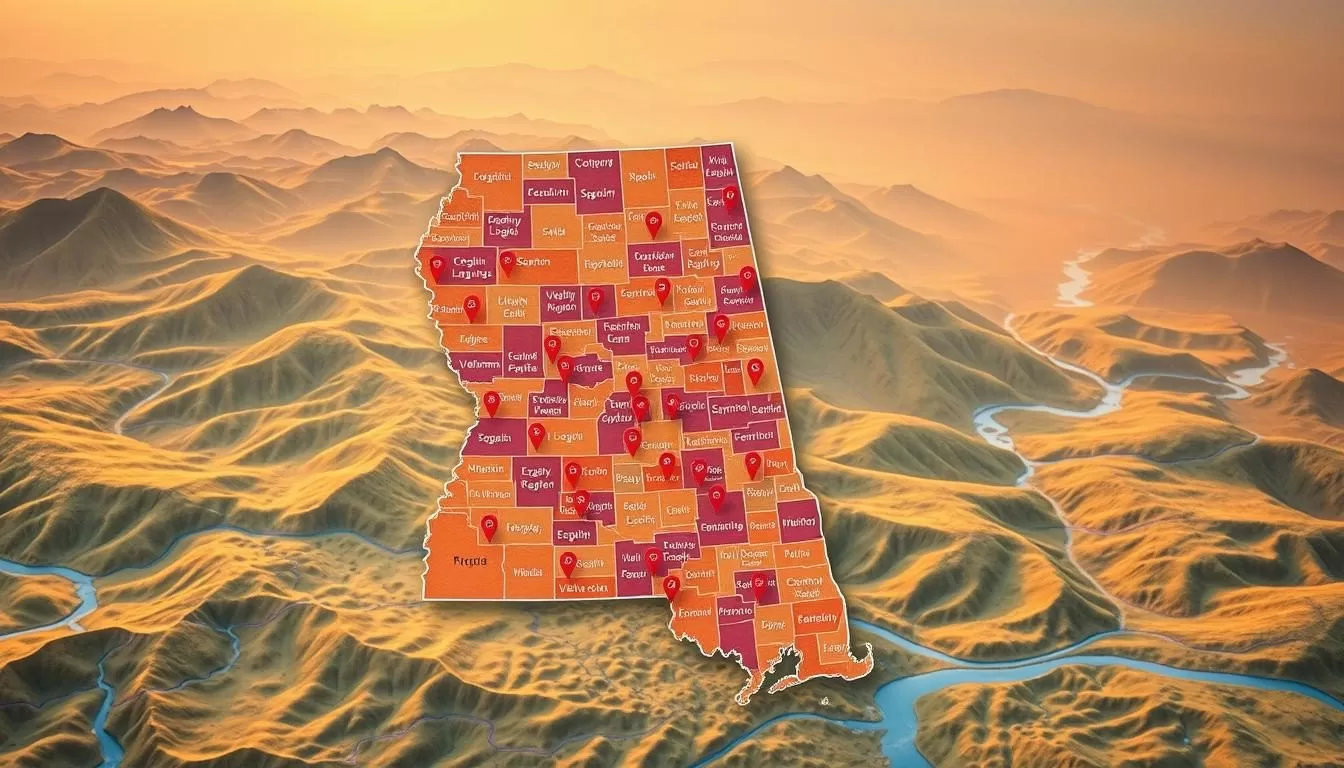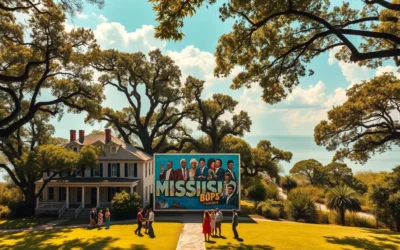✓ Accommodations ✓ Flights ✓ Rental Cars
You’re about to explore the diverse linguistic landscape of Mississippi, where the predominant language is English, spoken by 97.6% of the population at home.
Recent data reveals that a small but significant percentage, 2.4% (approximately 67,256 people), speak Spanish at home, while other languages like Vietnamese, Chinese, and French are also spoken across the state.
As you delve into this article, you’ll discover comprehensive insights into the linguistic diversity of Mississippi, including the languages spoken in households and the efforts to preserve Native American languages like Choctaw.
The Language Landscape of Mississippi
As you explore the linguistic diversity of Mississippi, you’ll discover a complex tapestry of languages shaped by the state’s rich history. The language spoken in Mississippi is predominantly English, but the state’s linguistic heritage is more nuanced.
Current Language Demographics in Mississippi
Mississippi’s current language demographics show that English is the dominant language spoken in households across the state. According to recent data, the prevalence of English-speaking households in Mississippi is notably high compared to other parts of the United States.
The linguistic diversity in Mississippi includes the continued use of Native American languages, such as Choctaw, spoken by approximately 800 people. This reflects the enduring legacy of Native American tribes in the region.
Historical Context of Language Development
The historical context of language development in Mississippi is marked by the influences of Native American settlement, European colonization, and African enslavement. These historical forces have shaped the linguistic landscape over time.
Historical data indicates that English became the dominant language during the colonial period, a trend that has remained relatively stable. The Great Migration of African Americans to northern states also influenced the linguistic profile of Mississippi, contributing to its unique population dynamics.
Understanding this historical context helps explain why Mississippi maintains a high percentage of English-speaking households, differing from states with more diverse immigration patterns.
Official Language Status in Mississippi
You need to know that Mississippi’s official language status has implications for various aspects of life in the state. English is the official language, but this doesn’t mean other languages are unprotected or unsupported.

English-Only Legislation and Policies
Mississippi has enacted legislation that establishes English as the official language. However, this doesn’t mean that other languages are entirely excluded from official contexts. Federal civil rights laws require meaningful access to federally funded programs for people with limited English proficiency. This means state agencies receiving federal funding must provide language access services.
The data shows that state agencies must comply with Title VI of the Civil Rights Act, ensuring that individuals with limited English proficiency have access to essential services. For instance, Mississippi’s Spanish-speaking population, which constitutes about 2.4% of the population, is entitled to language assistance in government services, healthcare, and legal proceedings.
Legal Status of Other Languages
While English is the official language, other languages have legal protections under federal law. The availability of non-English services varies across the state, often correlating with local language needs. A closer look at the language access services provided reveals the following:
| Language | Population Percentage | Services Provided |
|---|---|---|
| Spanish | 2.4% | Government services, healthcare, legal proceedings |
| Other languages | Varies | Limited services, varies by region |
This table highlights the dual system in place, where English is officially promoted, but multilingual services are still provided in certain contexts. As you explore further, you’ll find that the specifics of language access can vary significantly across different regions and institutions within the state.
Mississippi, United States: Official and widely spoken languages
As you explore the linguistic landscape of Mississippi, you’ll discover a diverse array of languages spoken across the state. The data on language use in Mississippi reveals a complex tapestry of linguistic diversity.
English as the Predominant Language
English is the predominant language in Mississippi, used by the vast majority of the population. It is the primary language for government, education, and daily life. You will find that most people in Mississippi speak English as their first language.
Spanish as the Most Common Non-English Language
Spanish is the most common non-English language in Mississippi, spoken by a significant number of households. The data shows that many people in Mississippi are bilingual, speaking Spanish at home and English in public.
Vietnamese, Chinese, and Other Languages
Other languages, such as Vietnamese and Chinese, are also spoken in Mississippi. According to the data, Vietnamese is spoken by approximately 5,951 people (0.21% of the population), while Chinese (including Mandarin and Cantonese) is spoken by about 3,984 people (0.14%). You may also encounter other languages like French (0.14%), German (0.11%), and Tagalog (0.10%), each spoken by between 2,800-4,000 people. These languages contribute to the rich linguistic diversity of the state.
- Vietnamese is the second most common non-English language, spoken by 5,951 people.
- Chinese languages are spoken in about 3,984 households.
- Other languages with significant presence include French, German, and Tagalog.
- These language communities often form cultural enclaves in specific areas.
- Income levels vary among these language groups, with some reporting higher median incomes.

English Proficiency Levels Across Mississippi
As you explore the linguistic landscape of Mississippi, you’ll discover the complexities of English proficiency across the state. The data reveals a nuanced picture of language use and its implications for the population.
Speaking English “Very Well” vs. “Less Than Very Well”
Understanding the level of English proficiency is crucial for addressing the needs of Mississippi’s diverse population. In Mississippi, approximately 23.3% of non-English speakers (about 16,800 people) report speaking English “less than very well.” This can create barriers to healthcare, education, and other essential services. You should understand that language barriers significantly impact the daily lives of these residents.
The data highlights the challenges faced by households with limited English proficiency, including lower income levels and difficulties accessing healthcare and education.

Language Barriers and Their Impact on Communities
Language barriers can have far-reaching consequences for communities. You may find that children in households where English is not spoken fluently face educational challenges. Although Mississippi schools are required to provide support for English language learners, the challenges persist.
- Healthcare outcomes can be negatively affected by language barriers, with LEP patients reporting higher rates of misdiagnosis and medication errors.
- Limited English proficiency can also lead to social isolation, particularly among elderly immigrants who may have fewer opportunities to develop English language skills.
The impact of language barriers on income and access to services is significant, making it essential to address these challenges to ensure equal opportunities for all people in Mississippi.
Native American Languages in Mississippi
As you delve into the linguistic landscape of Mississippi, you’ll discover the importance of Native American languages, especially Choctaw. The state’s Native American population contributes significantly to its language diversity.

The Choctaw Language: History and Current Usage
The Choctaw language is a vital part of the cultural identity of the Mississippi Band of Choctaw Indians. With a rich history, it has been spoken in the region for centuries. Today, efforts are being made to preserve and promote its use among tribal members.
You should know that the Mississippi Band of Choctaw Indians has implemented comprehensive language preservation efforts, including immersion programs in tribal schools and community language classes. The data indicates that these preservation efforts are crucial, as most fluent Choctaw speakers are elderly, creating urgency around language transmission to younger generations.
Preservation Efforts and Cultural Significance
Choctaw language preservation is closely tied to cultural revitalization, with language seen as a vehicle for maintaining traditional knowledge, ceremonies, and community cohesion. The tribe has developed modern Choctaw language resources, including dictionaries, textbooks, and digital applications to make learning more accessible to tribal members of all ages and income levels.
| Language Preservation Efforts | Description | Impact |
|---|---|---|
| Immersion Programs | Implemented in tribal schools | Enhances language fluency among younger generations |
| Community Classes | Available for all ages | Fosters community engagement and language preservation |
| Digital Resources | Includes dictionaries and applications | Makes learning accessible to a wider population |
Despite these efforts, language preservation faces challenges, including limited resources and competition with English in daily life. Nonetheless, the Choctaw community remains committed to preserving their linguistic heritage, recognizing its significance to their identity and cultural continuity.
Mississippi’s Language Diversity Compared to National Trends
The language patterns in Mississippi reflect broader trends in the East South Central region. As you explore the linguistic landscape of this state, you’ll notice that it shares characteristics with its neighboring states, including Alabama, Kentucky, and Tennessee.
How Mississippi Differs from National Averages
Mississippi’s language diversity is distinct when compared to the national average. The data indicates that this region has lower linguistic diversity, largely due to similar historical settlement patterns and immigration trends. Among the East South Central states, Mississippi has the lowest percentage of non-English speaking households at 2.4%. This is notable when compared to the national average and even to its regional counterparts, such as Alabama (5.2%), Kentucky (5.0%), and Tennessee (6.9%).
You can observe that the dominant non-English language in Mississippi and the surrounding states is Spanish, although the proportion of Spanish speakers varies. Mississippi has the lowest proportion of Spanish speakers among the East South Central states.
Regional Language Patterns in the East South Central States
The regional language patterns in the East South Central states show a trend of relatively low linguistic diversity. The population in these states tends to have a more homogeneous language profile, with English being the predominant language. However, there is a growing presence of Asian languages, such as Vietnamese and Chinese, particularly in urban areas and university communities where international students and professionals tend to settle.
As you consider the linguistic diversity in Mississippi and its neighboring states, it’s clear that while there are regional similarities, there are also differences in the data that reflect the unique characteristics of each state and its population.
Language Access Services and Requirements
Ensuring that language access services are in place is essential for promoting equity and inclusion. In Mississippi, various mechanisms are at work to provide language access to the population with limited English proficiency.
Federal Civil Rights Laws and Language Access
Federal civil rights laws mandate that entities receiving federal funding provide language access to individuals with limited English proficiency. This requirement is crucial for ensuring that people with diverse language backgrounds have equal access to services and information.
The data shows that compliance with these laws is critical in areas such as education, healthcare, and government services. Entities must provide translation and interpretation services to meet the needs of their diverse population.
Healthcare and Government Translation Services
In Mississippi, healthcare providers and government agencies are required to offer translation services to ensure that individuals with limited English proficiency can access necessary services. This includes providing languages support in healthcare facilities and government offices.
The provision of these services helps to bridge the gap for those who are not proficient in English, ensuring they receive the care and information they need. It is particularly important in healthcare, where clear communication is critical.
Educational Support for Limited English Proficient Students
Mississippi schools are required to identify and provide services to English Language Learners (ELLs) under federal law. In the 2019-2020 school year, there were approximately 14,000 ELL students, representing about 3% of the total student population—significantly lower than states like California, Texas, or New York.
Schools use various instructional models to support ELLs, including English as a Second Language (ESL) pull-out programs and sheltered instruction. The educational outcomes for ELL students often correlate with household income levels and the concentration of ELL students in a district.
Conclusion: The Future of Linguistic Diversity in Mississippi
As we conclude our exploration of Mississippi’s linguistic landscape, it’s clear that the state’s language demographics are poised for change. You’ve now gained a comprehensive understanding of the current state of languages in Mississippi and the potential trajectories for language use in the coming years. Thedata suggests that while Mississippi will likely remain predominantly English-speaking, gradual increases in Hispanic, Asian, and international populations may slowly diversify thelanguages spoken at homeacross the state.
The growth of international businesses and educational institutions in Mississippi may contribute to increased linguistic diversity in the future. As thepopulationbecomes more diverse, the state’s language policies and services will need to adapt to meet the needs of a potentially more diversepopulation. It is essential to recognize thatincome disparities between English-speaking and non-English-speaking householdsrepresent an ongoing challenge that intersects with language access issues.
The preservation ofNative American languages, particularly Choctaw, remains an important cultural priority that contributes to the state’s linguistic heritage. As Mississippi navigates these changes, the experiences of more linguistically diversestatesmay provide valuable lessons for developing effective language access policies and services. The future of linguistic diversity in Mississippi will ultimately be shaped by broader national trends inimmigration, economic development, and cultural exchangebetween the United States and other nations.
In the coming years, you can expect thelanguages spoken at hometo reflect the changing demographics of thestate. With thepopulationandhouseholdsbecoming more diverse, the need for language access services will likely grow, driven by the need to address theincomedisparities and ensure that allpeoplehave access to essential services.
The above is subject to change.
Check back often to TRAVEL.COM for the latest travel tips and deals.






